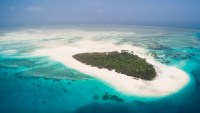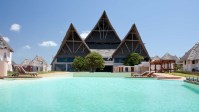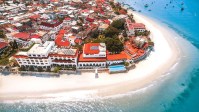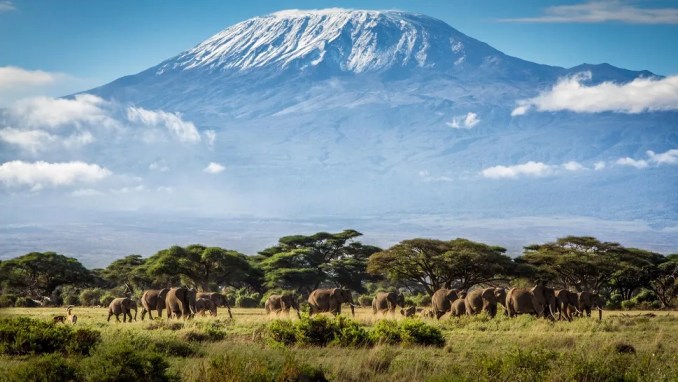A journey through Tanzania, Africa’s visual masterpiece, is one of the best trips one can make in a lifetime. It’s a country of astonishing natural splendor, incredible wildlife spotting, powder white beaches, charming ancient towns, and archaeological UNESCO world heritage sites. One of the most dramatic stages for a classic African safari is Tanzania’s Great Migration, where mighty herds of hundreds of thousands of wildebeest and zebras thunder across the Serengeti plains while chasing the rains in a race for life as they are purchased by a large number of predators. But the country offers much more than a Big Five safari experience. Africa’s highest mountain, Mount Kilimanjaro, rises 5,895 m (19,341 ft) above sea level from its surrounding lush, grassy plains. Its snow-capped peak is a sight to behold and towers over the land. Climbing Kilimanjaro is surprisingly easy and standing on the roof of Africa is a life-changing experience. Most visitors to Tanzania will end their unforgettable safari and mountain adventure with a serene and relaxing holiday on the sugar white, palm-fringed sands of Zanzibar, the intoxicatingly beautiful and exotic Spice Island. Tanzania also harbors some of the world’s finest and most luxurious hotels & lodges, matching the country’s breathtaking scenery.
Get the most out of your (luxury) trip to Tanzania with my travel guide. Find out more about:
- Best time to visit
- How to get there
- Travel requirements
- Getting around
- Inspiration, highlights, & travel tips
- Suggested itineraries
- Recommended luxury hotels (+ reviews)
BEST TIME TO VISIT
Tanzania sits on the equator and enjoys a pleasant climate year round. While there’s little fluctuation in monthly temperatures, the seasons do differ in the amount of precipitation received, which will affect your holiday, whether you are looking for a beach vacation in Zanzibar, a trek to the summit of the Kilimanjaro, or a safari in the national parks.
- The best time to visit Tanzania is during the long, dry season, from June to October, when most days are sunny and substantial rainfall is fairly unusual.
- Another popular time to visit Tanzania is during the short dry season from January to February when dry weather prevails although humidity is picking up.
- The worst time to visit Tanzania is during the main rainy season, or the ‘long rains’, which last from March to May. Daily heavy tropical downpours (mainly occurring in the afternoon) are the norm and can ruin a holiday.
- During November and December there’s another rainy season, the so-called ‘short rains’, but these are much lighter, less frequent and less reliable than the long rains.
The best time to visit Tanzania depends on your interests:
- The best time to witness the Great Migration in the Serengeti is probably February and March (start of the long rains) when the wildebeest and zebra congregate and calve on the vast treeless plains. Not only can you enjoy seeing baby animals, but the predators are at the highest number too. In June and July, the great migration hops over to Kenya’s Masai Mara and this is the time that you can witness spectacular Grumeti River crossings with crocodiles killing their prey (although it is hard to predict the exact time of this event).
- The best time for a beach holiday in Zanzibar is the long dry season (June to October), or the short dry season (January and February). During the short rains, it doesn’t rain every day, but days can be overcast and cloudy. Zanzibar is best avoided during the long rains.
- The best time to climb Kilimanjaro tends to be the warmest and driest months (July & August, and January & February). The primary issue is safety, as the risks associated with climbing increase significantly when the weather is foul. The effects of rain, mud, snow, ice and cold can be very strenuous on the body.
If you want to combine a safari, mountain trek, and beach holiday in one itinerary, I recommend to travel in July or February.
HOW TO GET THERE
Tanzania receives numerous international and domestic daily flights via its three main airports:
- Julius Nyerere International Airport (DAR) is the international airport of Dar es Salaam, the largest city in Tanzania. It is located about 12 kilometres (7.5 mi) southwest of the city centre. The airport has flights to destinations in Africa, Europe, and the Middle East. It is named after Julius Nyerere, the nation’s first president. Click here for a list of airlines that offer direct flights to Dar Es Salaam.
- Abeid Amani Karume International Airport (ZNZ) is the main airport in the Zanzibar Archipelago located on Unguja Island. It is about 5 kilometres (3.1 mi) south of Zanzibar City, the capital of Zanzibar. It was previously known as Kisauni Airport and Zanzibar International Airport, but was renamed in 2010 in honour of Abeid Amani Karume, the island’s first president. Click here for a list of airlines that offer direct flights to Zanzibar.
- Kilimanjaro International Airport (JRO) is the international airport in northern Tanzania that serves the cities of Arusha and Moshi. This is the preferred airport for a safari on the Northern Circuit. Click here for a list of airlines that offer direct flights to Kilimanjaro.
Some visitors prefer to fly to Kenia’s Nairobi International Airport (NBO), and then take a private or shared shuttle bus service which operates between Nairobi and Arusha, the closest town to the parks on the Northern Safari Circuit.
If you want to travel the entire country, it’s best to either arrive in Kilimanjaro and depart from Zanzibar, or the other way around. Some airliners offer multi-city tickets at often the same price for a round-trip ticket. KLM, Qatar Airways, and Ethiopian Airlines currently have the best connections to the country since they serve at least two airports within Tanzania.
Before you buy a plane ticket, consider reading my tips & tricks for buying the cheapest plane ticket.
TRAVEL REQUIREMENTS
Requirements for entry into Tanzania differ from country to country, and are subject to change. Prior to departure, always check with your government and your nearest Tanzanian embassy or consulate what documents you need for travel to Tanzania.
- You need an international passport with at least six months validity to enter Tanzania.
- Most nationalities need a tourist or business visa to enter Tanzania. You should get one from your nearest Tanzanian embassy or consulate before you travel.
- You need a yellow fever certificate. Although Tanzania is not listed as a Yellow Fever endemic country, immigration officials may ask to see Yellow Fever vaccination certificates or exemption certificates upon arrival.
Make sure you read my 10 tips to plan a worry-free trip.
GETTING AROUND
Although self-driving in Tanzania is not recommended due to poor road conditions, it’s still easy to get around by making use of one of the several modes of transportation that are available:
- When you book a safari, the operator or lodge will always arrange a driver who doubles as an informal guide. Most tourists in the Northern Circuit will explore the National Parks in that area (Serengeti, Ngorongoro, Tarangire and Lake Manyara) with a driver in a four-wheel drive vehicle.
- Domestic flights are the quickest and most comfortable option if you want to visit several parts of the country during your journey. There are several domestic airlines that link the most popular safari destinations and provide services to the coast. Some of the more upmarket safari lodges have their own airstrips and use small planes operated by private air charter companies to ferry their guests in, which is a good alternative to long drives on dusty roads. These are some of Tanzania’s domestic airlines that offer online bookings:
- Long-haul buses are the best and cheapest way to travel for tourists on a budget. Large buses and dala-dala cover a nation-wide network that links the major towns, including international routes from Dar es Salaam to Nairobi and Mombasa in Kenya. As I experienced myself during my travels in Tanzania as a student, some of the buses are (dangerously) tired, can be driven rather recklessly, and can be overcrowded.
- There are two major railways that crisscross Tanzania and offer a limited number of services per week. Clean bedding is provided in cars with sleeping berths, and there are dining cars. However, trains are best avoided since the rolling stock is very old and dirty, the trains get overcrowded with not only people but also sacks of vegetables and livestock, and theft is common.
INSPIRATION, HIGHLIGHTS & TRAVEL TIPS
There are several good reasons why you should put Tanzania on your bucket list:
- Be awe-inspired by the Great Migration in the Serengeti
- Climb Mount Kilimanjaro
- Track chimpanzees in Gombe Stream National Park
- Observe the wildlife in the Ngorongoro crater
- Relax on Zanzibar’s magnificent white sand beaches
- Explore Stone Town, a UNESCO World Heritage site
- Stay at some of Africa’s best safari lodges and beach resorts
The following, in-depth articles may also inspire you and help you plan your holiday to Tanzania:
- Top 10 best things to do in Tanzania
- Top 10 most fabulous luxury hotels & lodges in Tanzania
- Top 10 best luxury resorts in Zanzibar
- Tips & tricks for getting the best deal at a luxury hotel
- Tips & tricks for buying the cheapest plane ticket
SUGGESTED ITINERARIES
It’s impossible to suggest one itinerary for Tanzania, but I hereby share with you a schedule based on my own holidays in Tanzania, which is great if you want to see archipelago in a time frame of three weeks, hereby making use of domestic flights.
- Week one: Northern Safari Circuit (2 nights at Lake Manyara, 2 nights at Ngorongoro, and 3 nights at the Serengeti National Park). Recommend safari operator: &Beyond or Singita.
- Week two: climb Mount Kilimanjaro. There are seven established routes to climb Mount Kilimanjaro, varying from 5 to 9 days. Known as the “Coca-Cola” route, the Marangu route is most well established route. Many favor the Marangu route because it is considered to be the easiest path on the mountain, given its gradual slope. It is also the only route which offers sleeping huts in dormitory style accommodations. Make only use of a reputable travel agency to organize your trek.
- Week three: explore Zanzibar: stay two nights in Stone Town (recommended hotel: Park Hyatt Zanzibar), followed by 4 to 5 days of relaxation in a beach resort (recommended hotel: &Beyond Mnemba Island).
For the planning of your own travel itinerary in Tanzania, I highly recommend the excellent itineraries as provided by The Lonely Planet and Frommers.
RECOMMENDED LUXURY HOTELS (+ REVIEWS)
Consider visiting my top 10 lists if you are eager to know how I rank Tanzania’s top hotels, based on my own experience:
Below, you find my reviews of hotels in Tanzania (with pros, cons, and tips to save money per hotel).
 Review: Hideaway of Nungwi Resort & Spa (Zanzibar)
Review: Hideaway of Nungwi Resort & Spa (Zanzibar) Review: &Beyond Mnemba Island (Zanzibar, Tanzania)
Review: &Beyond Mnemba Island (Zanzibar, Tanzania) Review: Essque Zalu Zanzibar (Tanzania)
Review: Essque Zalu Zanzibar (Tanzania) Review: Park Hyatt Zanzibar (Tanzania)
Review: Park Hyatt Zanzibar (Tanzania)
*** Follow me on Twitter, Instagram and Facebook for a daily moment of travel inspiration ***



This is a very elaborate guide for Destination Tanzania.
I like the fact that you have mentioned about the Chimpanzee tracking at Gombe Park. Its something unique thing you can do in Tanzania apart from the excellent game viewing in Serengeti and other Northern Circuit Parks.
Zanzibar is among my favorite Indian Ocean beaches in East Africa.
I suggest fundu lagoon on Pemba island as an alternative to Zanzibar, great place and great people.